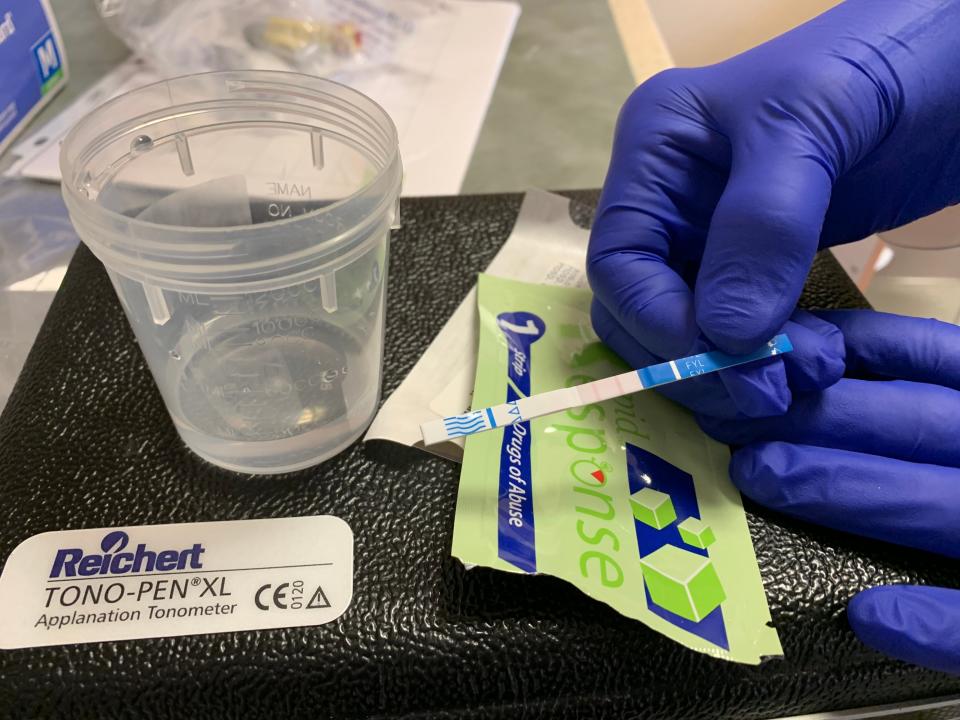Delaware's plan to prevent more overdoses involves fentanyl testing strips. Here's how it works.
Fentanyl test strips will now be a regular part of kits distributed by the state's Office of Health Crisis Response containing the overdose-reversing medication Narcan, according to the state Division of Public Health.
State health officials said these test strips – which Delaware considered paraphernalia until Gov. John Carney signed a bill in 2021 that allowed their distribution – are a preventative measure for those using drugs.
The strips make it possible to test anything from marijuana to cocaine, meth or ecstasy for the presence of fentanyl, a synthetic opioid that is highly addictive and has been a leading driver of fatal overdoses in recent years. Users can then choose not to use that drug or protect themselves with other measures. The test strips are highly sensitive and will detect fentanyl down to 0.1 mcg/ml.
This is especially important because fentanyl cannot be detected by sight, taste, smell or touch. Most overdoses are unintentional, health officials said, and people may not realize the strength of the drug they are using or that it contains fentanyl.
DRUG TESTING:Fentanyl drives Delaware's overdose deaths but drug tests don't screen for it
What is the impact of fentanyl on Delaware?
One in 1,949 Delawareans died of drug overdoses in 2021, according to the state's Division of Forensic Science. Another 42 died of suspected overdoses in May 2022 alone, according to the Department of Health and Social Services. It's the highest count of fatal overdoses ever recorded in Delaware.
Matching a national trend, fentanyl is the leading cause of drug overdose deaths in Delaware, found in more than 80% of fatal overdoses.
While data showed that cocaine overdoses were also on the rise last year, health officials even linked that to fentanyl being added to stimulants like cocaine with growing frequency, oftentimes without users' knowledge.
How do testing strips help?
Fentanyl test strips are one example of harm-reduction strategies, which aim to lessen the negative effects of drug use. This approach is based on the increasing understanding that addiction is not a choice, but rather a disease.
“Including fentanyl test strips in Narcan kits, is part of a comprehensive strategy to reduce overdose deaths in the state,” Dr. Rick Hong, DPH interim director, said in a statement.
HARM-REDUCTION:From clean needles to free naloxone, local outreach groups are reducing harm of addiction
Even if a person chooses to use a drug after detecting fentanyl in it, Hong said they can follow other “harm-reduction strategies,” like going slow, not using as much or not using alone.
Since those kits also include Narcan, the overdose reversal medication also known as naloxone, Hong said it empowers family, friends and neighbors to act and help their loved one who is battling with substance use disorder.

“We will continue to discourage drug use and encourage people to seek treatment,” Hong said, “but for persons with substance use disorder, we are using a compassionate approach to help raise awareness and empower friends and family to act in an emergency situation.”
FENTANYL TESTS:The difference between high and dead: Drug testing strips detect fentanyl in heroin
Some organizations like Brandywine Counseling and Community Services have been providing fentanyl test strips alongside clean needs since at least 2019.
Federal health organizations like the Centers for Disease Control and Prevention have also recently underlined the need for fentanyl test strips in preventing overdoses.
In April 2021, just before Delaware permitted the distribution of test strips to individuals and organizations, the CDC announced that it would permit states to purchase fentanyl test strips and distribute them to the public by using Overdose Data to Action, or OD2A, funding.
This OD2A program helps jurisdictions collect high-quality, comprehensive and timely data on nonfatal and fatal overdoses – which they can then use to inform prevention and response efforts, according to DPH.
Delaware’s public health division is one of 66 jurisdictions that joined the OD2A cooperative agreement that focuses on surveillance and prevention strategies.
OVERDOSES IN DELAWARE:A forgotten Delaware community hiding in plain sight and the drug problem that plagues it
Delaware is also part of a growing list of states that have decriminalized fentanyl test strips, but DPH said laws may vary throughout the country. In the First State, people can also mail-order a 10-pack of fentanyl test strip kits for free. For more, visit helpisherede.com/understanding-addiction/what-is-fentanyl.
State health officials also recommend overdose response training for anyone who has a prescription opioid or knows of someone that has or is using illicit drugs. After the quick training, the individual will receive Narcan.
How to find help
For community training offerings and information on where you can get free Narcan, go to: https://www.helpisherede.com/overdose-prevention.
DHSS’ 24/7 Crisis Hotline: 800-652-2929 (New Castle County) or 1-800-345-6785 (Kent and Sussex counties) for treatment and recovery options.
Delaware Hope Line: 833-9-HOPEDE for free 24/7 counseling, coaching and support, as well as links to mental health, addiction and crisis services. Resources also can be found on the Help is Here website.
Suicide and Crisis Lifeline: 988
SAMHSA National Helpline: 800-662-HELP (4357) for free 24/7 substance abuse disorder treatment referral services. Treatment service locators also are available online at findtreatment.samhsa.gov or via text message by sending your ZIP code to 435748.
Syringe Services Program: Mobile outreach sites are available statewide for free needle exchanges, HIV and hepatitis C screenings and treatment referrals. See the monthly schedule online at brandywinecounseling.com/ssp.
Reporter Hannah Edelman contributed to this report.
Emily Lytle covers Sussex County from the inland towns to the beaches, with a focus on health-related issues. Got a story she should tell? Contact her at elytle@delmarvanow.com or 302-332-0370. Follow her on Twitter at @emily3lytle.
This article originally appeared on Delaware News Journal: Delaware aims to reduce overdoses by offering fentanyl testing strips

